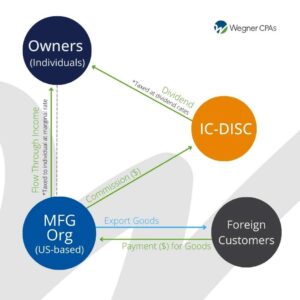What is an IC-DISC?
An IC-DISC, or Interest Charge Domestic International Sales Corporation, provides extensive Federal income tax savings for U.S. exporters and manufacturers. An IC-DISC is a non-taxable C-Corporation that creates an avenue for businesses that export their products to lower their tax liability.
IC-DISCs can produce tax savings by turning a portion of the business’ export revenue into qualified dividends through a tax-deductible commission to the IC-DISC.
This effectively reduces the taxable income of the export business. Since the IC-DISC is non-taxable, the commissions it’s paid are exempt from federal income tax. The commissions are only taxable when they are paid to owners as qualified dividends at much more favorable rates at the individual level. The individual shareholders of the IC-DISC will then pay taxes on the dividends up to a maximum of 23.8% which is made up of a 20% dividend tax and 3.8% for net investment income tax (NIIT).
How an IC-DISC Works
- The owner or partners of the operating company pay a tax-deductible commission to the IC-DISC.
- The commission amount is equal to the greater of 4% of the operating company’s gross receipts from qualified exports or 50% of the operating company’s net income from qualified exports.
- The operating company records the commission as an expense on their books which in turn lowers ordinary income taxed at max of 37%.
- The IC-DISC is exempt from paying taxes on the commission income received, but remember that the shareholders will be subject to dividend taxes and NIIT on the dividends received from the IC-DISC.
Potential Considerations
- An important item to keep in mind is that if the IC-DISC chooses not to pay dividends to the shareholders, interest will be applied to the deferred tax that is often based on Treasury Bill rates.
- Additionally, any income considered to be taxable of the IC-DISC relating to qualified export receipts exceeding $10 million will be designated as distributed and subject to capital gain tax and NIIT.
Compliance Requirements
Since the IC DISC is its own entity, it must maintain its own books or records. Additionally, a commission agreement with the related entity selling the products is also a requirement.
Other requirements include:
- Minimum of $2,500 in capital every day of the tax year
- Can only have one class of stock
- File form 4876-A within 90 days of incorporation
- File an income tax return by the 15th day of the 9th month after its tax year
- IC-DISC and exporting company must be related and under common control but 100% identical ownership is not required
Increased Savings for Manufacturers
Our tax and business advisors have successfully leveraged IC DISCs to help clients maximize their tax savings while remaining compliant with the US Tax Code. While our team is very experienced in leveraging these tax-exempt entities for manufacturing organizations, this incentive is available to almost any US taxpayer that has qualifying exports including individuals, C Corps, S Corps, partnerships, and LLCs. Don’t miss out on significant tax savings, get in touch with a Wegner CPAs advisor to learn how this strategy can benefit you.





